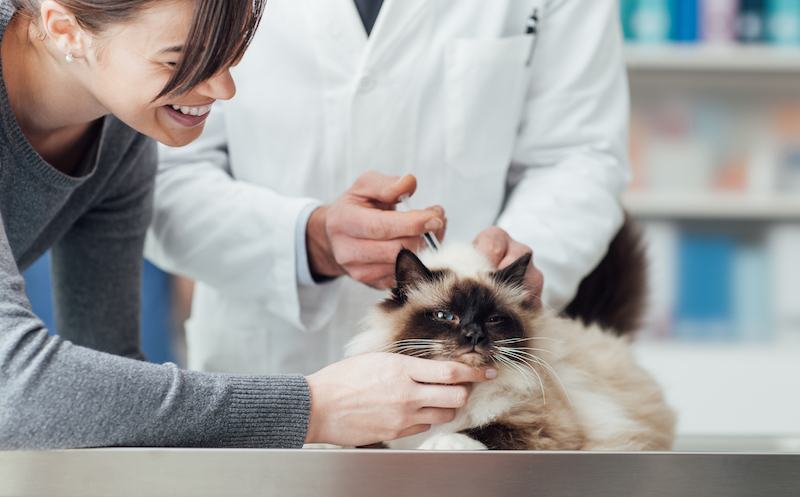Cats may seem like they are better than everyone (they certainly seem to think so), but they still need the protection of vaccines in order to live a healthy and happy life. As with dogs, there are a number of core, and non-core vaccines which are available through a veterinarian. The core vaccines are for the most common infections, and should be administered to every cat. The non-core vaccines, however, are administered based on a variety of factors (as determined by a veterinarian) such as age, breed, current health, potential exposure to diseases, and the likelihood of contracting the virus based on access to or visit to certain geographic areas or regions.
Vaccines & Vaccination Schedule
Like puppies, kittens are able to receive vaccinations at an early age. Vaccinations can start as early as 6 weeks of age. The combination, interval, and variety of vaccinations administered will and should be determined by your veterinarian. The core feline vaccines are:
Calicivirus: This vaccine is meant to protect against a respiratory infection which results in ulcers on the tongue, intestine, and the musculoskeletal structure. It is a highly contagious virus among unvaccinated felines, and is more prevalent in multi-cat households. Symptoms of infection include loss of appetite, ocular and nasal discharge, pneumonia, labored breathing, joint inflammation, elevated body temperature, and lameness.
- Vaccination at 6-8 weeks, and every 3-4 weeks thereafter until 16 weeks of age. Booster at 12-14 months, & every 3 years thereafter.
Panleukopenia (Feline Distemper): The vaccine is designed to protect against the highly contagious disease which is caused by a virus, and attacks cells such as those in the digestive tract, bone marrow, lymphatic system, and developing nerves. The symptoms include elevated body temperature, vomiting, diarrhea, and seizures.
- Vaccination at 6-8 weeks, and every 3-4 weeks thereafter until 16 weeks of age. Booster at 12-14 months, & every 3 years thereafter.
Rabies: The vaccine is designed to protect against the viral disease the attacks the central nervous system. Symptoms of the infection include minor abnormalities in the nervous system, which eventually leads to more severe symptoms including fever, seizures, fear of water, slackness in the jaw, difficulty swallowing, lack of muscular control, fearfulness or shyness, and paralysis.
- Vaccination at 8-10 weeks, and boosters 12 months apart after 1 year of age.
Rhinotracheitis: The vaccine is meant to protect against the virus which causes Feline Upper Respiratory Disease Complex, which affects the mouth, nasal and sinus passages, upper airways, and even the eyes.
- Vaccination at 6-8 weeks, and every 3-4 weeks thereafter until 16 weeks of age. Boosters at 12 months of age, followed by every 3 years.
Some non-core but recommended vaccinations include:
- Feline Leukemia
- Chlamydophila
- Feline Infectious Peritonitis
- Bordetella
- Giardia
- Feline Immunodeficiency Virus

